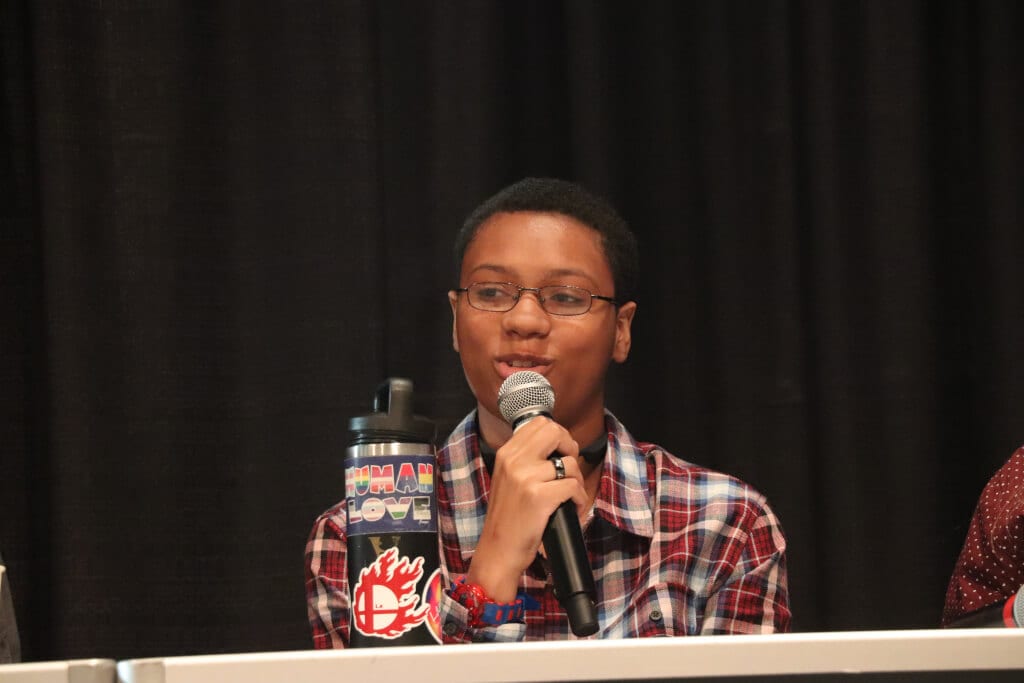Elysia Tillman, 21, is President of the Vanderbilt Autism and Neurodiversity Alliance.
NASHVILLE, TN – People with autism seem to be locked away into their own heads a lot of the time. According to the Center for Disease Control (CDC) about 2% of the general population have autism. Five times more boys have it than girls. One in 42 boys have it; one in 168 girls.
Those numbers are based on health and school records of 8-year-olds. But a lot of people with autism are not diagnosed until they are much older. Five of six panelists at the College Inclusion Summit last week at Vanderbilt University were diagnosed only after they went away to college.
“It was probably one of the most inspiring things I have ever learned about myself,” said Elysia Tillman, a 3rd year Spanish and Sociology major at Vanderbilt University. Tillman is President of the Vanderbilt Autism and Neurodiversity Alliance (VANA). She’s into board games and she juggles.
“I went through high school thinking there was something wrong with me,” she said.
People with autism have brains that work differently. They miss social cues and have communication difficulties. But they also have incredible focus and given support and acceptance, autistic people can solve problems and outperform their peers. The social stigma people suffer from having autism is probably the worse thing about it.
According to the Bureau of Labor Statistics, only 42% of young adults with autism have paying jobs. Most who work have part-time low-wage jobs. Compared to others with disabilities, young adults with autism have the highest unemployment rate. Many people with autism don’t interview well because they don’t communicate easily.
But some people with autism can pass for normal. Disclosing you have Autism Spectrum Disorder (ASD) is like outing yourself. Everybody is somewhere on the spectrum, but even so, some people prefer to hide their condition from others in order to get a good job.
“The hardest part was putting on the entirety of social camouflage and mask hoping it didn’t slip the wrong way during that interview,” said Claire Barnett, a recent graduate from Vanderbilt who has autism.
Job interviews can be really tough for people with autism. You want to be authentic and advocate for yourself but honesty is not always the best policy.
“We have sort of assembled this camouflage to enter into society. It gives us the opportunity to pretend to be neuro-typical and not be noticed as different if we don’t want to be,” Barnett said.
She fell into her current communications job at the Frist Center for Autism and Innovation. She said she didn’t even really interview for it. For other jobs she had to study the interview protocols carefully.
“When do I nod and smile? When am I supposed to shake hands? How much eye contact do I make?”
Members of the College Autism Network (CAN) visited Vanderbilt University last week for a three-day summit. Research about college students with autism started at Florida State University in late 2014. People wanted to know what challenges autistic students face in higher ed and they started collecting evidence to develop programs to help them succeed.
Since 2014 hundreds of colleges have joined CAN. Some run summer boot camps for students with autism to get them ready for college. Some have required courses every semester where students get academic coaching, supervised study sessions, and peer and faculty mentoring.
Experts from many disciplines do research at the Frist Center for Autism and Innovation at Vanderbilt University.
“One half of what we do is this research that we can then send out into the world and say ‘this is how you best employ people within the spectrum’ but the other half is working with individuals,” said Barnett.
Finding a job is really important for young adults with ASD. Their families have protected them and after they leave home they must advocate for themselves. If they fail, they face social isolation or economic dependency for the rest of their lives, so the pressure to succeed can be intense.
Big companies like JP Morgan Chase, Ernst & Young, the investment bank UBS, and Asurion have been hiring and training people with ASD for several years. And they have been changing their workplace environments to accommodate their autistic employees. Bottom line is: it improves their bottom line when they do.
Once considered unable to do for themselves, autistic students thrive with the right support in a college setting, and can go on to successful careers in multi-national corporations after they graduate. But it takes understanding, acceptance, and support. Not everybody gets that.
Dr. Monique Colclough is an educational researcher at North Carolina State University. She gave a session called Neurodiversity in Community Colleges and Beyond. She talked about training faculty in best practices to help autistic students earn credentials or enter a 4-year college. “What we need and what we have, don’t match,” said Colclough.
Many CAN members said scaling up their pilot program is their biggest challenge. Educators from cash-strapped community colleges swapped tips and strategies to leverage resources for disabled students and collaborate with each other.



